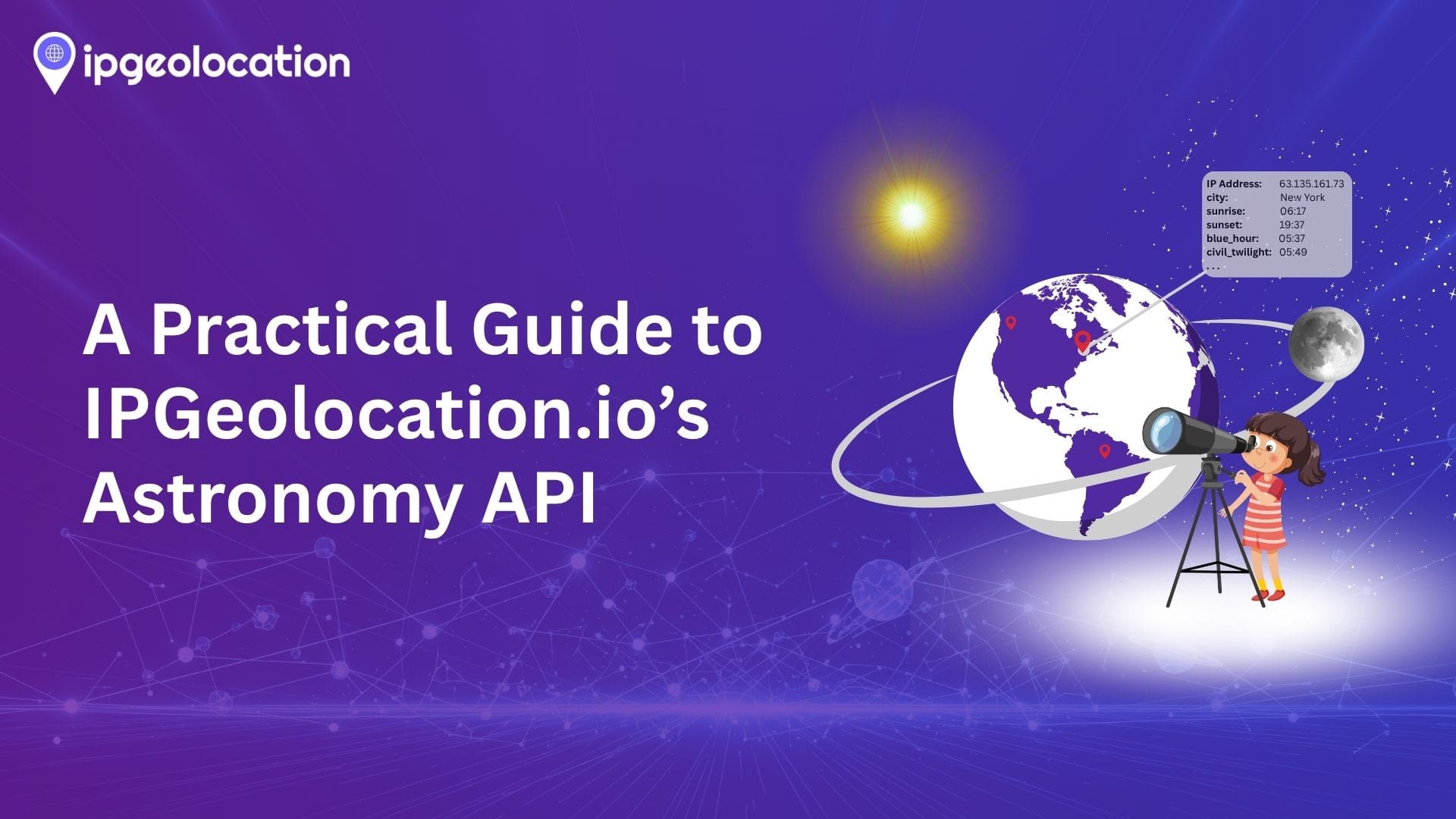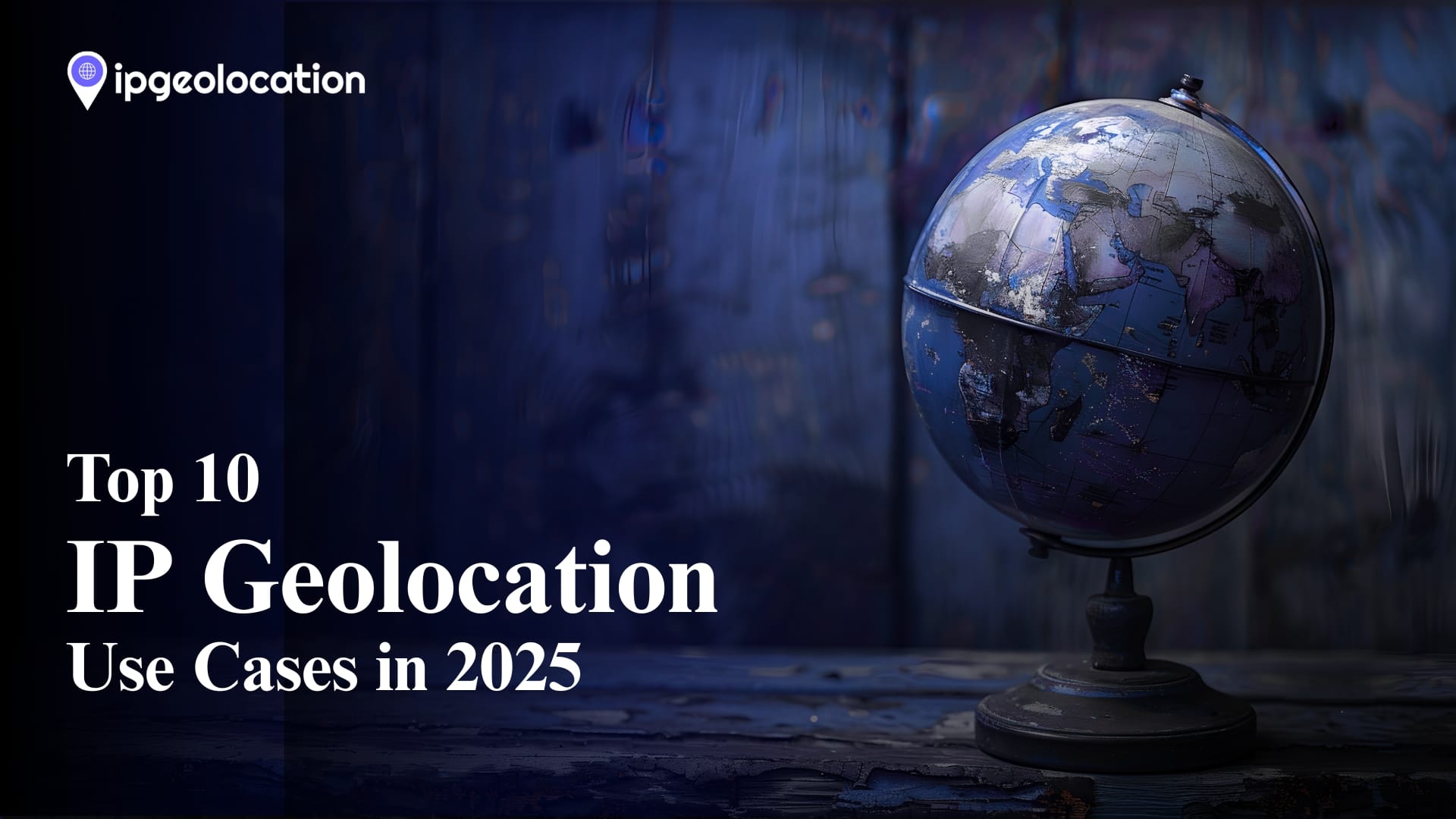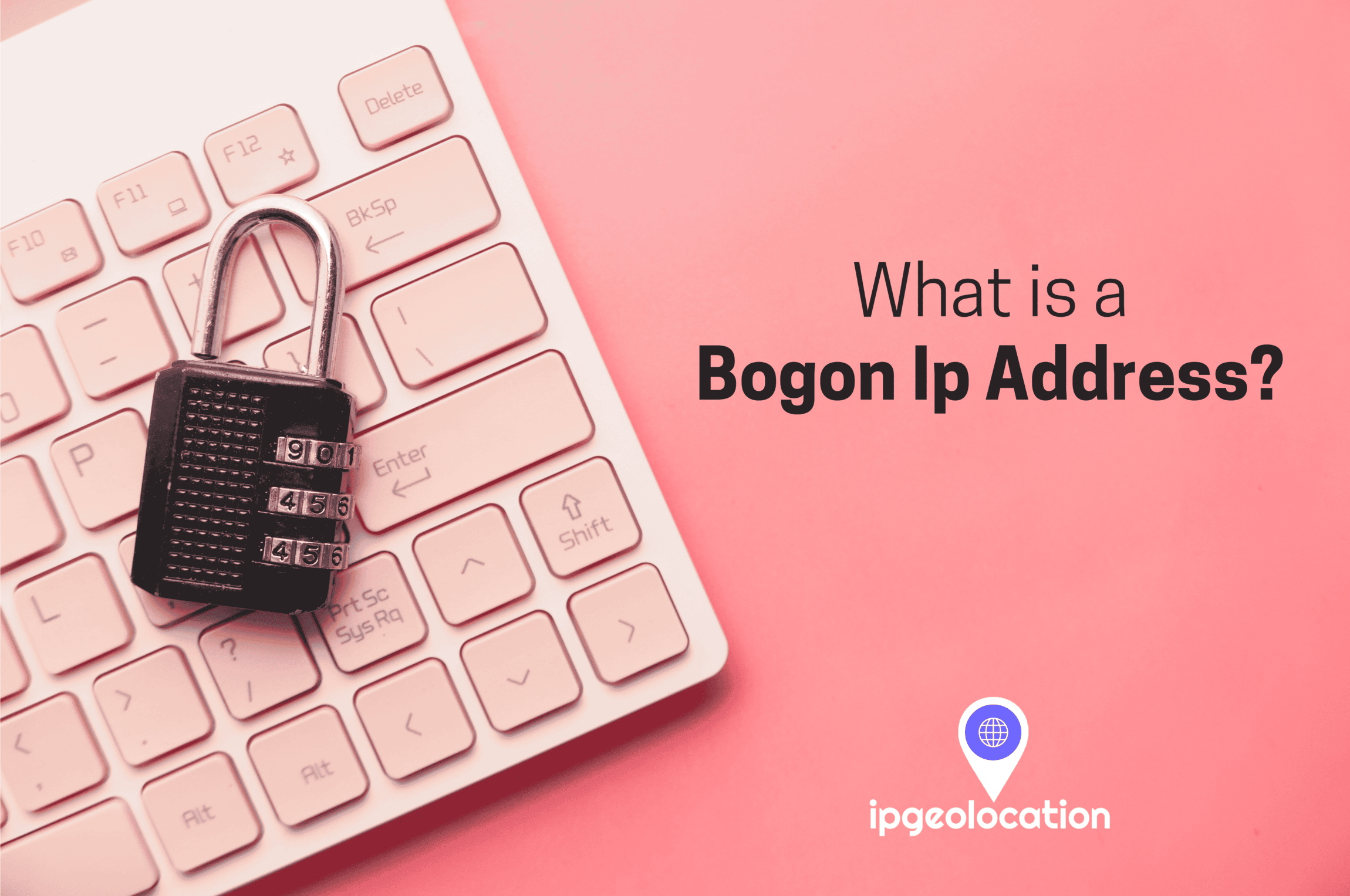Table of Contents
Have you ever wondered how a website or app knows exactly what you need, showing you the right content, timing things perfectly or keeping you secure without bothering you? The technology working behind the scene is IP Geolocation. Every device on the internet has an IP address (a unique numeric label) through which it is connected to internet, and IP Geolocation is the process of mapping that IP address to an approximate geographic location (country, city, etc.). In simple terms, it’s a way to figure out where in the world a device is connecting from, just by using the IP address. This is usually done via an IP Geolocation API which lets apps look up location information (like country, region, city, ZIP code, time zone, and even whether the connection is through a proxy) in real time.
Why does this matter? Because knowing a user’s location (without even needing GPS) helps tailor and secure online experiences in many surprising ways. Businesses and apps use IP Geolocation to personalize content, serve relevant ads, detect potential threats and security threats, comply with regional laws, and even route you to the nearest server for faster service. All of this happens behind the scenes in milliseconds.
In this blog, we'll discuss five ways how IP Geolocation improves your online interactions from personalized content to faster app performance. Each section below highlights how this technology makes the internet more user-friendly, secure, and efficient.
1. Instant Personalization Through Localized Content
One of the most visible benefits of IP Geolocation is content personalization based on your location. Websites and apps can automatically show you content that’s relevant to your geographic location. For example, a news website might detect your city and immediately display your local news and weather forecasts instead of some generic content. An e-commerce site can greet you with the correct country or region site and show prices in your local currency, which is far more convenient than making you choose settings. It has been observed that displaying product prices in a user's local currency can significantly boost online sales. According to a report by ipgeolocation.io, simply showing prices in local currency can increase conversion rates by up to 40%. When things are in your language and currency, you feel more at home on the site and are more likely to trust it.
Localized content goes beyond currency and language. By using IP Geolocation API, stores can highlight region-specific deals or the nearest stores location. Streaming services might auto-select subtitles or audio in your local language. Travel sites can default to your nearest airport. As a key takeaway, greeting users with location-tailored content increases their comfort and trust. When Amazon launched country-specific sites, they saw how auto-detecting location to show the correct local site, local deals, and pre-filtered shipping options led to more checkouts and happier customers. In other words, IP Geolocation helps websites speak your language , making your experience smoother and more personalized from the first click.
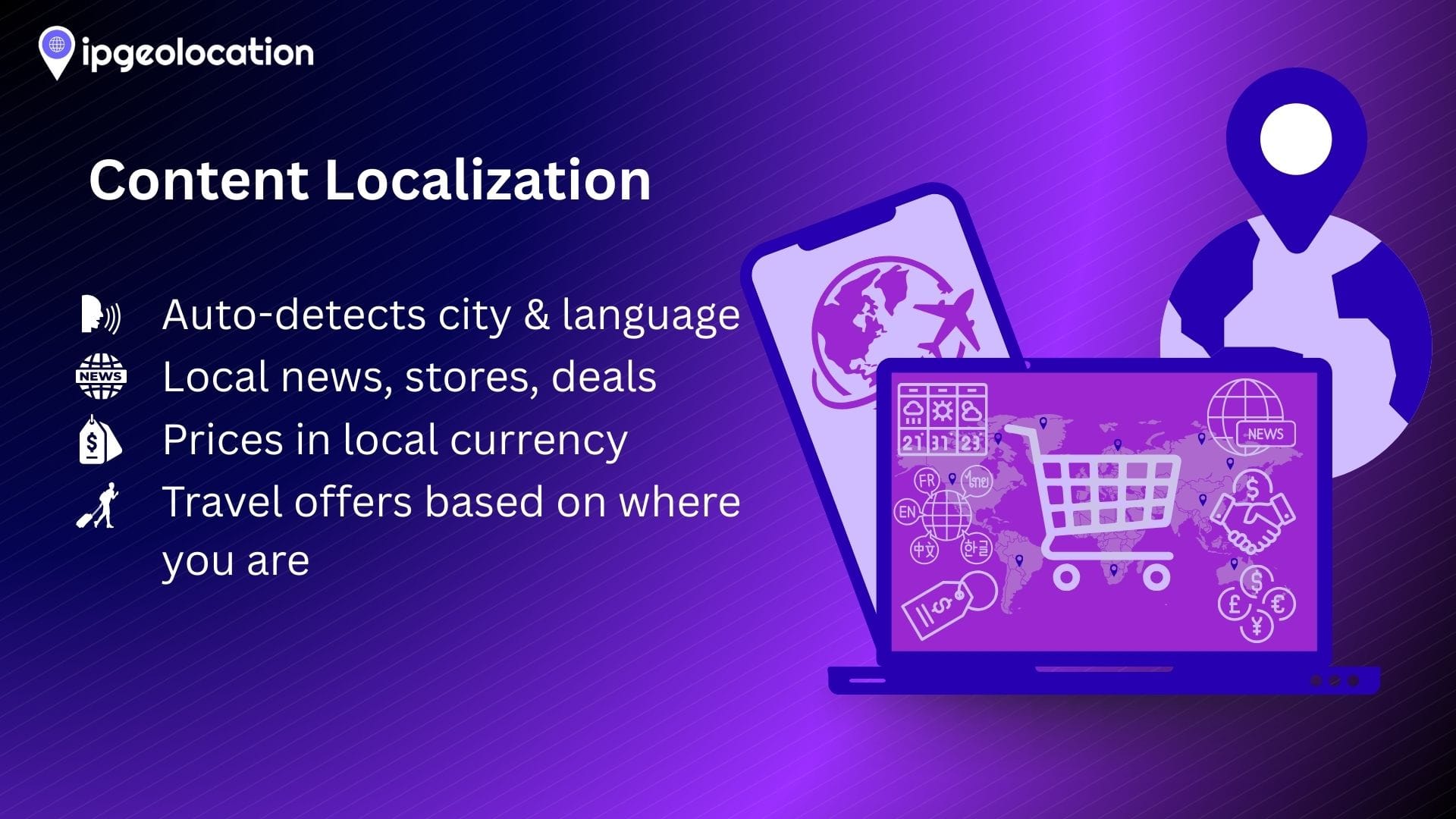
2. Targeted Advertising That Feels Relevant (Not Spammy)
Another use of IP Geolocation is in online advertising, specifically making ads more relevant to you. Rather than showing generic ads (which often feel spammy or irrelevant), ad platforms use your IP based location to serve targeted advertising that actually matches your area. For example, if you’re in New York, you'll see ads for local restaurants or services in New York, not an ad for something in Tokyo or London. Big advertising networks like Google and Facebook let advertisers geo-target their campaigns. A local business can choose to show its ads only to people within a certain city or radius. This means you get ads that are at least geographically relevant which is a huge improvement over random ads for products not even available in that country/region.
From the user’s perspective, this targeting is a win because the ads feel more useful and less like spam. And it turns out, localization greatly improves ad performance. According to a survey conducted by ipgeolocation.io , about 67% of marketers say that the primary benefit of location data is more precise ad targeting and smart location targeting can boost ad conversion rates by up to 500%. That’s a massive difference in effectiveness, simply by showing people content tuned to where they live. It’s better both for advertisers and for you. You’re more likely to see offers that make sense for your location (no more promos for a store on the other side of the world). This is a “win-win situation for both customers and merchants.” Users more easily find what they want, and businesses see higher engagement and return on their ad spend. In short, IP Geolocation helps transform online ads from annoyances into occasionally helpful suggestions by ensuring they’re relevant to you.
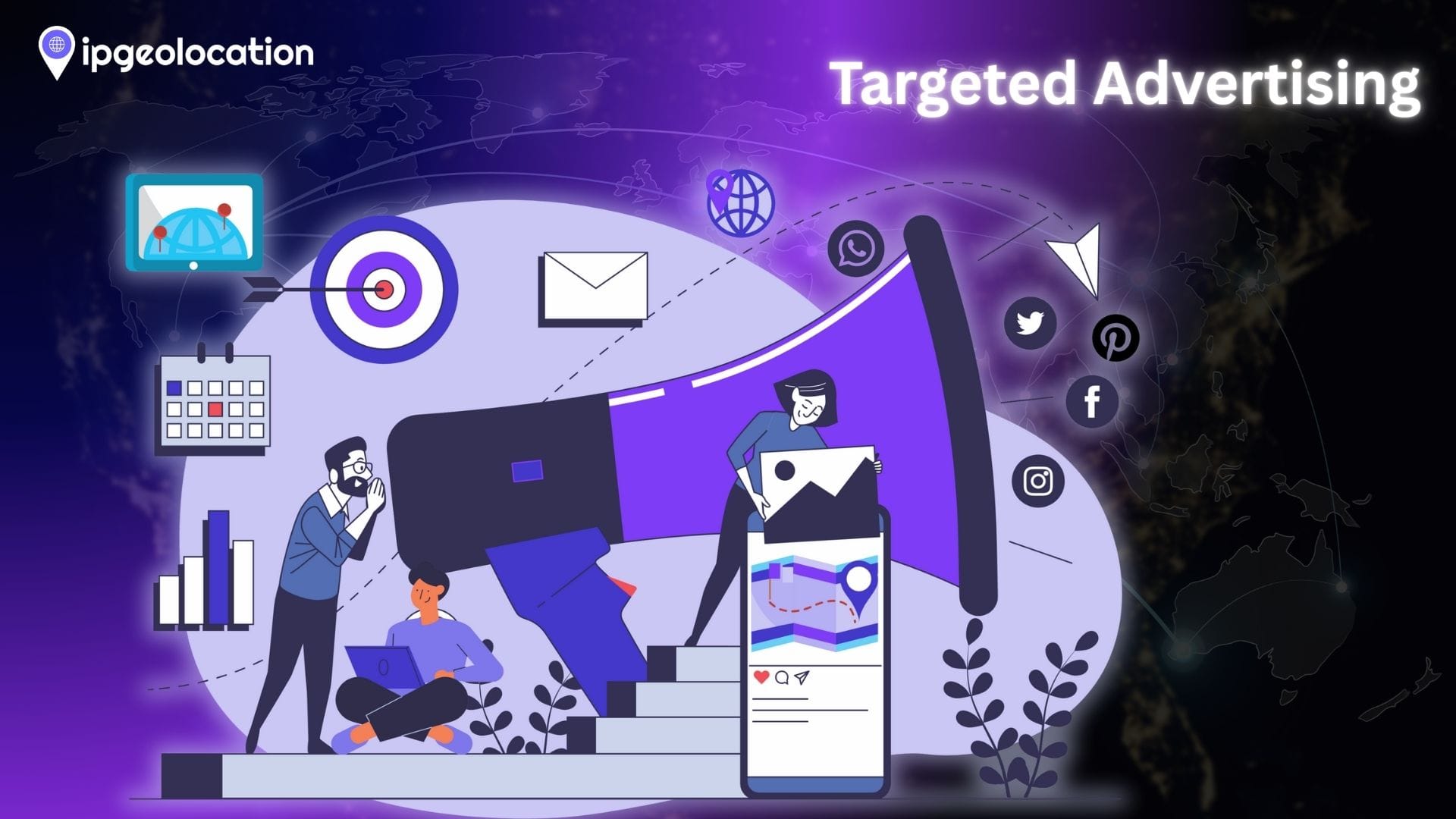
3. Fraud Detection and Enhanced Security
IP Geolocation is not just about personalization. It plays a key role in cybersecurity as well. Apps and websites use IP-based location information to detect suspicious activity and protect you from online frauds and account theft. A common application is detecting unauthorized access attempts. For example, if a user typically logs into their bank account from New York and a login attempt suddenly originates from Russia or Brazil, that’s a red flag. Many services will notice this mismatch and trigger extra verification or alerts. By identifying the geographic origin of logins and transactions, companies can spot potential frauds in real time. For instance, geolocation data helps catch impossible travel scenarios, say you log in from New York and an hour later, someone tries the same account from London, that’s likely an attacker using stolen credentials. Systems can flag or block such events as potential threats.
Banks and online stores also use IP Geolocation to spot unusual activities. In e-commerce, a common way to verify the orders is to see if the customer’s IP location matches their billing address or the shipping destination. If the IP location doesn’t match their billing address, it could be a sign of credit card fraud. Merchants will often investigate or decline such orders. In fact, basic fraud screening guidelines recommend verifying that the geolocation information for an IP is consistent with the purchaser’s provided address, if there is any discrepancy then it is a red flag. Additionally, IP Geolocation services (like ipgeolocation.io) usually include threat intelligence data, identifying IPs known to be VPNs, proxies, or bot networks. If a login or purchase comes from a known proxy or TOR node, that’s suspicious and might be blocked or challenged. Modern IP Geolocation APIs (like ipgeolocation.io's IP Security API) can even tell if an IP is from a cloud hosting provider or data center (which regular home users don’t use), indicating a possible bot or attacker server.
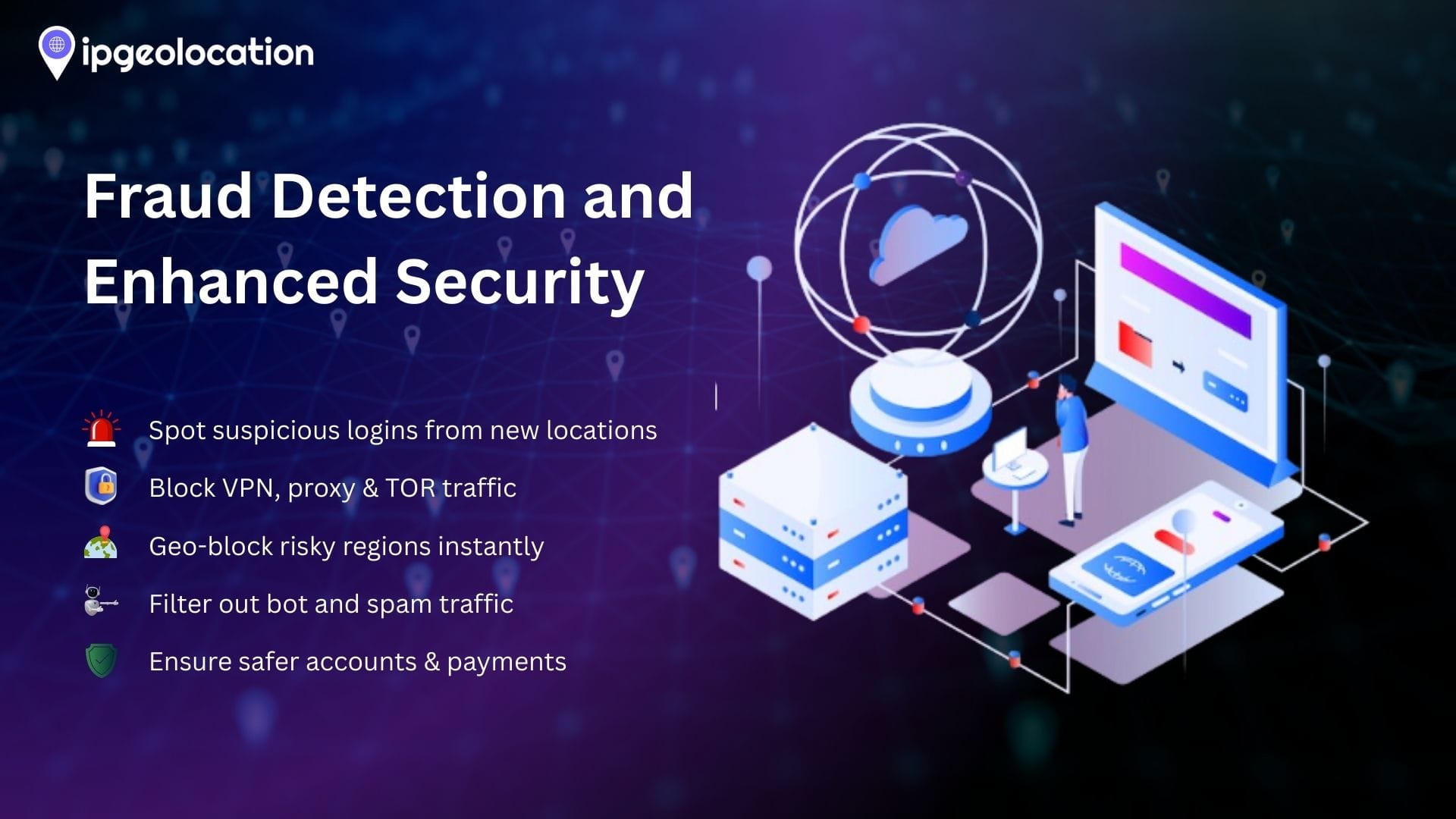
All these measures mean a safer online experience for you. Geolocation adds an extra layer of defense by enabling location-based rules and companies can geo-block high-risk regions that they never expect legitimate users from, or require extra verification for accounts logging in from unusual places. One analysis found that a huge portion of global web traffic (almost 42%) is malicious or unwanted bots, much of which can be filtered out by using region-based blocking and IP data. In practice, that means fewer fake accounts, fewer spam logins, and a reduced chance of your account being compromised. So, the next time your email or bank app asks “Was this you logging in from X country?”, remember that’s IP Geolocation, quietly working to keep your account secure.
4. Regulatory Compliance and Geo-blocking
The internet may be global, but laws and content rights are often local. IP Geolocation plays a big role in regulatory compliance, essentially making sure online services follow the rules of each region. One common example is geo-blocking, if you’ve ever tried to watch a video or use a service only to see "This content is not available in your country", that’s geolocation at work. Streaming platforms like Netflix and Disney+ use IP-based location detection to enforce licensing agreements, showing you only the movies and shows licensed for your country and blocking those that aren’t. While it can be frustrating as a user to have a smaller catalog, it’s the reason these services can operate internationally without legal issues. They restrict access to content or services based on geographic location to comply with distribution rights and local regulations.
Geo-blocking is not just about blocking user's from seeing a particular video on streaming platform, it’s equally involved in things like privacy law compliance. Countries have different data laws, for example, the European Union’s GDPR requires that EU users get certain privacy protections (like cookie consent notices and data storage limitations). Websites use IP Geolocation API (like ipgeolocation.io's IP Geolocation API) to detect EU visitors and automatically show them a GDPR cookie consent banner or adjust what data is collected. Meanwhile, a user from a country where those rules are not applicable, might not see the same prompts. Similarly, online services might block users from sanctioned or high-risk countries to comply with international laws. In fact, the U.S. Treasury’s OFAC guidelines encourage screening and blocking IP addresses from sanctioned regions and companies have been fined for not doing so.
There are also cases of apps that only operate in certain areas by choice. For example, a food delivery service in Montreal could use Geolocation API to ensure only people in Montreal can use the app, since it doesn’t serve other places. And state-specific regulations (like online gambling laws or viewing age-restricted content) can be enforced by checking IP locations. All told, IP geolocation helps shape your online experience so that it automatically fits local norms and laws. It’s the reason you see appropriate content for your region and get the right legal notices. While sometimes it means geo-restrictions (not accessing a service from outside its region), it also means companies are being responsible with your data. In short, IP Geolocation lets digital platforms respect the borders that exist in the real world, keeping them compliant and keeping you on the correct side of any regional rules.
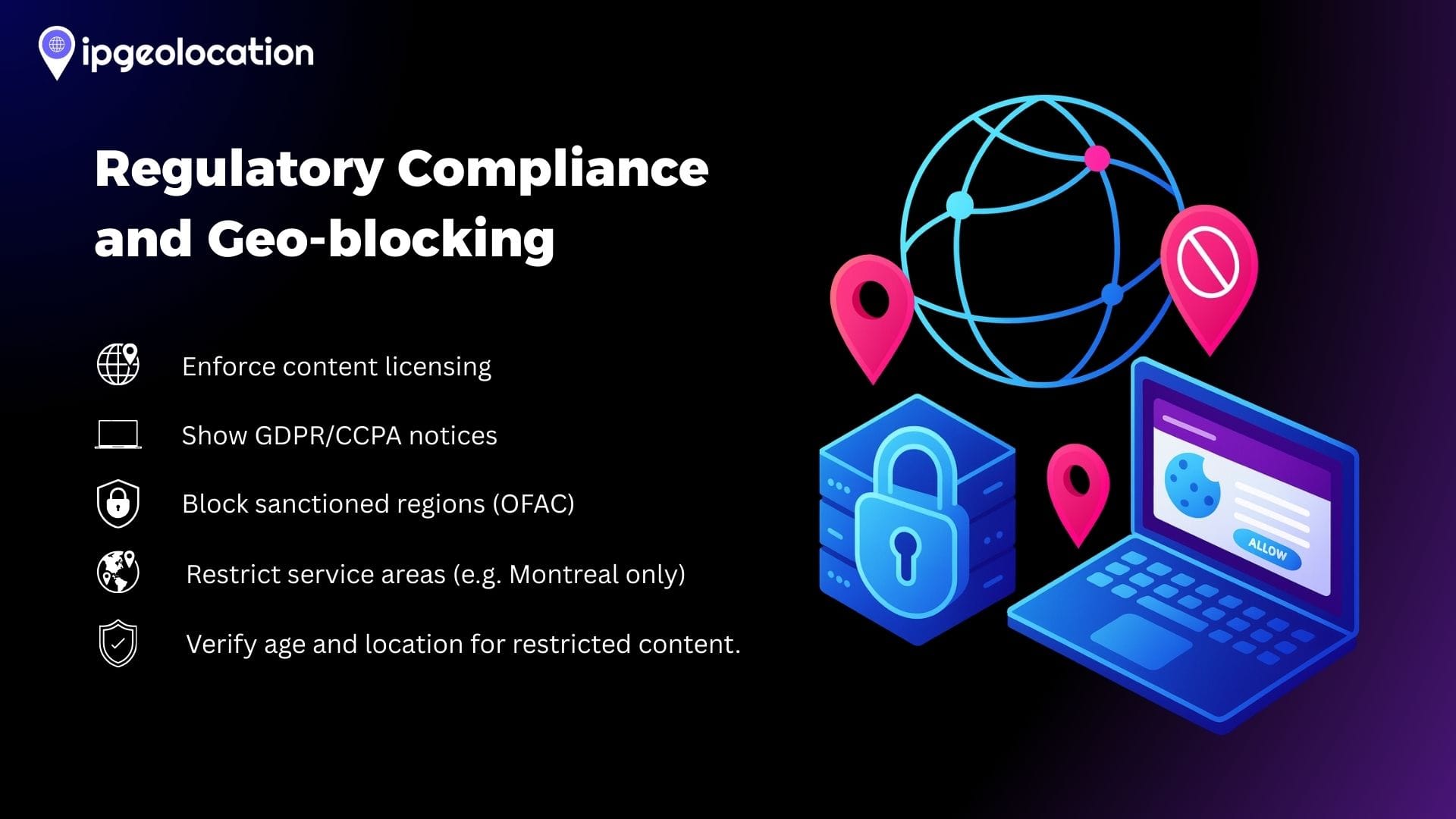
5. Improved App Speed with Smart Routing
Have you ever noticed that global websites load pretty fast, or when you download an app or software from a websites, it often connects to a nearby server? Thanks to IP Geolocation for helping with smart routing. Large websites and apps boost their performance by using multiple servers around the world and direct your requests to the nearest node. When you visit a site or open an app, it fetches your IP location and then connect you to the nearest node (or data center) in your region. This drastically reduces the latency (response time). This result in quicker page loads, less lag, and a smoother experience.
This technique is often called geo-DNS or geolocation-based routing. For example, many content delivery networks (CDNs) and cloud services do this behind the scenes. If you’re in Asia and use a service like a game or a cloud application, your IP might be automatically routed to an Asian server, whereas someone in Europe will hit a European server. All of that is decided instantly based on the user’s IP address. Another example is Cloudflare’s network, it has data centers all over the globe and directs visitors to the nearest one, which is why a website using Cloudflare loads quickly from pretty much anywhere.
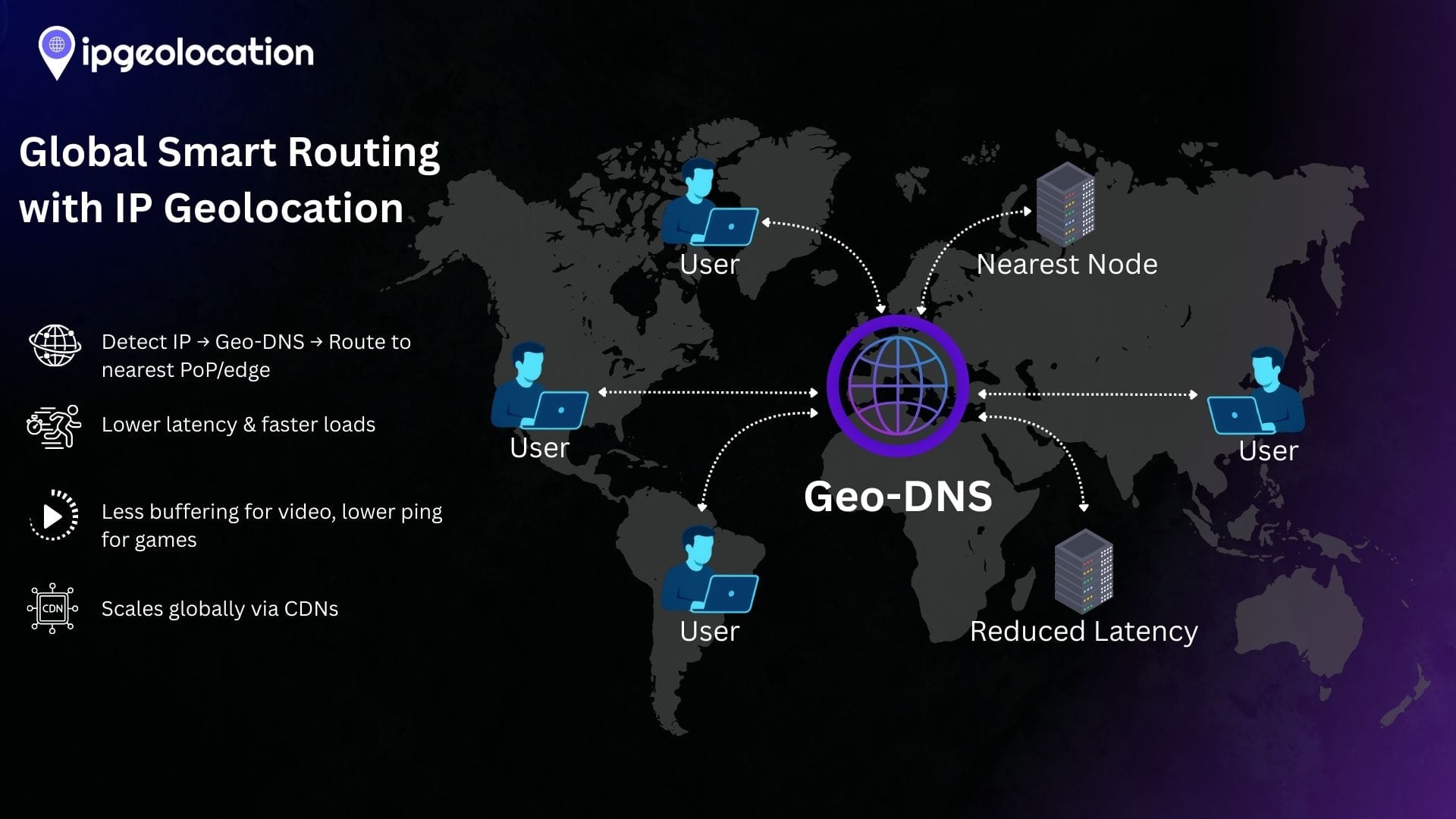
For the user, smart routing is a silent benefit, you just know that the app feels fast. But it’s a big reason modern internet services can scale globally without making you suffer slow speeds. No one wants to wait while data pings across the planet if it doesn’t have to. By automatically connecting you to nearest node, IP Geolocation helps reduce buffering, latency, and other speed issues. This is especially important for things like video streaming (less buffering when the server is nearby), online gaming (lower “ping” times), and real-time applications. In essence, IP Geolocation helps the internet itself run more efficiently by shortening the distance between you and the content or service you’re accessing. It’s like having a local shortcut on the information superhighway, making your everyday online apps snappier and more responsive, no matter where you are.
Conclusion
IP Geolocation might sound technical, but as we’ve seen, it quietly powers many features that make our digital lives easier, safer, and more enjoyable. To recap, by using your device’s IP address, services can personalize content to fit your locale, show you ads and offers that actually matter to you, strengthen security by catching suspicious logins or transactions, enforce geo-restrictions and legal compliance seamlessly, and even speed up apps by routing your request to nearest server. And all of this happens behind the scenes in milliseconds, without any manual interaction. For developers and businesses, IP Geolocation data has become an invaluable tool. Of course, IP-based location isn’t pinpoint precise (it typically knows your city or region, not your exact street address), but it’s usually accurate enough to enable these convenient features without invading personal privacy.
Subscribe Our Newsletter
Get the latest in geolocation tech, straight to your inbox.
Start for
Free
No Credit Card Needed
Access up to 1,000 requests/day with our forever free plan.
Sign Up Free








